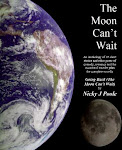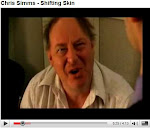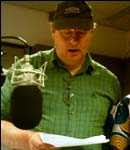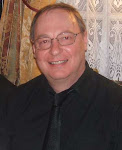(Beginning of story about a modern day mystery to track down a large amount of money left behind after World War 2 to spy on the Soviets, and still around today after the fall of the Berlin Wall)
I got off the Tube and stepped out into the summer heat of the Brompton Road. I strolled slowly, not wishing to work up a sweat in my Saville Row suit, passed Harrods and turned on to Hans Crescent and approached the big house. I climbed the stone steps and rang the bell labelled, "Strategic Research Consultants." No voice responded, the door lock simply buzzed and I let myself inside.
Cadwallader was standing at the balustrade of the first landing and beckoned me up. I often wondered whether this was his real name. But surely, if he was going to pick a fake one, he would have chosen something less conspicuous than Cadwallader. He led me into a lounge with Chesterfield sofas, that was noticeably cooler than the sultry day outside. He invited me to sit down. His only concession to hospitality was to give me, without speaking, a glass of iced water, instead of offering me something from the laden drinks tray on a table by the far wall. To be fair, he took only a glass of iced water for himself and, to be fair, the water was welcome.
He settled down opposite me and suddenly his steel-blue eyes fixed on me and the rest of the room ceased to exist.
"What do you know about the SOE?" His voice was quiet, but deadly serious. I wasn’t expecting a history test. Or maybe he was reminiscing, about to write his memoires.
I cleared my throat. "Well, SOE stood for ‘Special Operations Executive.’ They carried out raids and supplied the various resistance forces against the Nazis in Europe during World War Two."
"Absolutely," he said, levelly. "They were the covert British force during the war." He took a sip of his water. "And what was the Secret Intelligence Service’s role during this period?"
I felt like I was at a job interview and I had just been caught out. "MI6? I’ve no idea."
He put his glass down on the rosewood table in front of him. I noticed there wasn’t a coaster – condensation would run on to the table top. "Exactly," he said. His voice was still quiet, but it was as if he had spoken with sudden forcefulness. "And what happened," he continued, "when the war ended and the Soviets took control of Eastern Europe? Where was the SOE then?"
Again I had to admit I didn’t know. "Didn’t MI6 take over then?"
"And what happened to the SOE?" I couldn’t help feel he was harping on about this. "I thought they were disbanded."
"Indeed," he sighed. "They were disbanded. Despite, as Churchill predicted, that an Iron Curtain would descend over Eastern Europe."
"What does it matter?" I tried to stand my ground. "We had intelligence services watching the Soviets. What’s in a name?"
"You are right. What’s in a name? Many former SOE operatives eventually moved over to MI6."
"That’s what I thought," I offered.
"But what you don’t know was that SOE had plans for when the Russians arrived."
"That seems reasonable."
"SOE had plans," he emphasised the word, "to stay back, behind the Iron Curtain. Stay back! They knew the contacts. They knew the territory. They knew what was needed. They were not pleased at being closed down, and the scraps that were left to be assimilated into the SIS."
"I can imagine." I sipped my ice water.
"They also had the funds in place, in certain instances, to support stay-back groups."
I felt he had finally reached the true point of this meeting he had called with me. "Funds?"
"Yes. Funds. You can’t run a spy cell without something to pay your people. The SOE put funds in place to support a number of groups. They had to hand all this over to MI6 when they were closed down."
"I see," I said. Even though I did not. At least, I didn’t see what his interest was in all this.
"Sometimes it wasn’t always possible to keep track, in some cases, just where support of this nature had gone. Especially when a stay-back group had already been up and running for a while… before the war ended and the Soviets arrived."
"You mean," I felt I was being encouraged to guess, "not all the funds were accounted for."
"Why should the SOE hand on a plate, chapter and verse, an account of everything they had worked so hard to achieve, to an organisation that was about to move on to their turf and have them shut down?"
"But surely," I found myself sipping my water again, "any money involved would have been spent within months – years at most – of any cash put forward to run a covert group behind the Iron Curtain?"
"Normally, yes, you’d be right," He nodded. Everything seemed to hinge on that word, ‘normally.’ "But in one particular case, they was a virtual treasure trove set in place, but was never used for any purpose. It was not, how might you say? – ready!"
"But SOE still told MI6 – the SIS – about it, all the same?" It was a dumb question. I already knew the answer.
"SOE had just started to create one of its most ambitious stay-back groups in Belgrade, to infiltrate the entire Balkan region, when it took a bullet in the head from His Majesty’s Government, and MI6 – the Secret Intelligence Service – took over. But one of the many secrets they did not pick up on in those early post-war, Cold War days, was the money SOE had left behind to spy on the Russians in defence of the realm, the job they assumed but had been so absent from during the fight against the Nazis."
I felt this was getting needlessly didactic. "But what does that matter today? Here in the 21st Century?"
I could see Cadwallader bridle at this remark. "I’m not talking about politics," he hissed. His voice had dropped even more, and yet was more malevolent. "I am talking about the money."
"What money?"
"The money. Taxpayers’ money that was sent abroad to pay for a spy network that never came into existence."
"Fine. Right. Taxpayers’ money." I drained my glass and was prepared to hit the streets outside. I stood up.
"The money is still out there. In toto, as they say, if you’ve had a classical education. In a form that has kept – nay, appreciated in value."
"Yeah?"
"In today’s terms, we are talking a lot of money. It’s all still there, nobody knows about it. It’s just waiting for someone to go and pick it up."
"In what form?"
"Diamonds. Round, uncut."
"Worth how much?"
"At today’s prices? One hundred million dollars."
I don’t remember sitting down again. I do remember thanking him for the brandy he handed me from the drinks tray. "And," he added, "I want you to go and fetch them. For a share. Interested?"
Cadwallader was standing at the balustrade of the first landing and beckoned me up. I often wondered whether this was his real name. But surely, if he was going to pick a fake one, he would have chosen something less conspicuous than Cadwallader. He led me into a lounge with Chesterfield sofas, that was noticeably cooler than the sultry day outside. He invited me to sit down. His only concession to hospitality was to give me, without speaking, a glass of iced water, instead of offering me something from the laden drinks tray on a table by the far wall. To be fair, he took only a glass of iced water for himself and, to be fair, the water was welcome.
He settled down opposite me and suddenly his steel-blue eyes fixed on me and the rest of the room ceased to exist.
"What do you know about the SOE?" His voice was quiet, but deadly serious. I wasn’t expecting a history test. Or maybe he was reminiscing, about to write his memoires.
I cleared my throat. "Well, SOE stood for ‘Special Operations Executive.’ They carried out raids and supplied the various resistance forces against the Nazis in Europe during World War Two."
"Absolutely," he said, levelly. "They were the covert British force during the war." He took a sip of his water. "And what was the Secret Intelligence Service’s role during this period?"
I felt like I was at a job interview and I had just been caught out. "MI6? I’ve no idea."
He put his glass down on the rosewood table in front of him. I noticed there wasn’t a coaster – condensation would run on to the table top. "Exactly," he said. His voice was still quiet, but it was as if he had spoken with sudden forcefulness. "And what happened," he continued, "when the war ended and the Soviets took control of Eastern Europe? Where was the SOE then?"
Again I had to admit I didn’t know. "Didn’t MI6 take over then?"
"And what happened to the SOE?" I couldn’t help feel he was harping on about this. "I thought they were disbanded."
"Indeed," he sighed. "They were disbanded. Despite, as Churchill predicted, that an Iron Curtain would descend over Eastern Europe."
"What does it matter?" I tried to stand my ground. "We had intelligence services watching the Soviets. What’s in a name?"
"You are right. What’s in a name? Many former SOE operatives eventually moved over to MI6."
"That’s what I thought," I offered.
"But what you don’t know was that SOE had plans for when the Russians arrived."
"That seems reasonable."
"SOE had plans," he emphasised the word, "to stay back, behind the Iron Curtain. Stay back! They knew the contacts. They knew the territory. They knew what was needed. They were not pleased at being closed down, and the scraps that were left to be assimilated into the SIS."
"I can imagine." I sipped my ice water.
"They also had the funds in place, in certain instances, to support stay-back groups."
I felt he had finally reached the true point of this meeting he had called with me. "Funds?"
"Yes. Funds. You can’t run a spy cell without something to pay your people. The SOE put funds in place to support a number of groups. They had to hand all this over to MI6 when they were closed down."
"I see," I said. Even though I did not. At least, I didn’t see what his interest was in all this.
"Sometimes it wasn’t always possible to keep track, in some cases, just where support of this nature had gone. Especially when a stay-back group had already been up and running for a while… before the war ended and the Soviets arrived."
"You mean," I felt I was being encouraged to guess, "not all the funds were accounted for."
"Why should the SOE hand on a plate, chapter and verse, an account of everything they had worked so hard to achieve, to an organisation that was about to move on to their turf and have them shut down?"
"But surely," I found myself sipping my water again, "any money involved would have been spent within months – years at most – of any cash put forward to run a covert group behind the Iron Curtain?"
"Normally, yes, you’d be right," He nodded. Everything seemed to hinge on that word, ‘normally.’ "But in one particular case, they was a virtual treasure trove set in place, but was never used for any purpose. It was not, how might you say? – ready!"
"But SOE still told MI6 – the SIS – about it, all the same?" It was a dumb question. I already knew the answer.
"SOE had just started to create one of its most ambitious stay-back groups in Belgrade, to infiltrate the entire Balkan region, when it took a bullet in the head from His Majesty’s Government, and MI6 – the Secret Intelligence Service – took over. But one of the many secrets they did not pick up on in those early post-war, Cold War days, was the money SOE had left behind to spy on the Russians in defence of the realm, the job they assumed but had been so absent from during the fight against the Nazis."
I felt this was getting needlessly didactic. "But what does that matter today? Here in the 21st Century?"
I could see Cadwallader bridle at this remark. "I’m not talking about politics," he hissed. His voice had dropped even more, and yet was more malevolent. "I am talking about the money."
"What money?"
"The money. Taxpayers’ money that was sent abroad to pay for a spy network that never came into existence."
"Fine. Right. Taxpayers’ money." I drained my glass and was prepared to hit the streets outside. I stood up.
"The money is still out there. In toto, as they say, if you’ve had a classical education. In a form that has kept – nay, appreciated in value."
"Yeah?"
"In today’s terms, we are talking a lot of money. It’s all still there, nobody knows about it. It’s just waiting for someone to go and pick it up."
"In what form?"
"Diamonds. Round, uncut."
"Worth how much?"
"At today’s prices? One hundred million dollars."
I don’t remember sitting down again. I do remember thanking him for the brandy he handed me from the drinks tray. "And," he added, "I want you to go and fetch them. For a share. Interested?"
To be continued (possibly…)
.jpg)






No comments:
Post a Comment